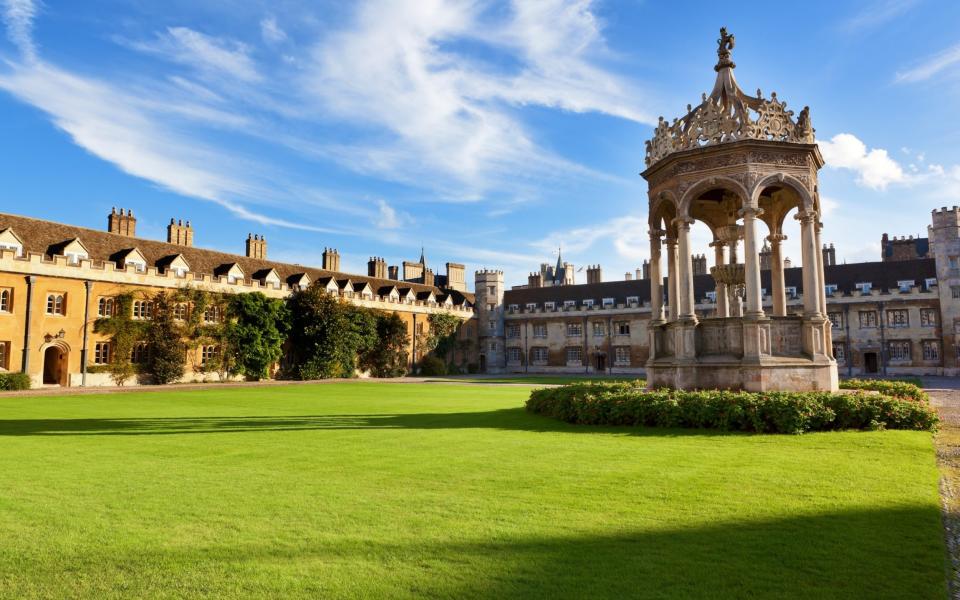‘Sordid’ student-teacher sex scene finally banned at Cambridge

Tom*, a Cambridge University graduate in his mid 20s, fondly remembers the night that a 40-something tutor at his college tried to pick him up.
“We met at a formal dinner and had probably five or six hours of friendly conversation, and it was all quite flirty back and forth,” says Tom, who was 19 at the time.
“She was very attractive and in great shape, and I knew what was going on, but didn’t feel like she was out looking for younger guys in particular,” he says. “At the end of the night, she asked me which way I was walking and, at that point, I politely declined to go home with her because I had a girlfriend at the time,” Tom says. “But if I was single I absolutely would have wanted to see where things went.”
A few weeks later, it transpired that the woman was a tutor for Tom’s friend, also 19. “For some reason he brought me up in a supervision, and the tutor asked if I was the handsome student she met at dinner,” he recalls. “She said she had a really nice time with me at the dinner and would have loved for it to go further.”
Such things were so common as to be the norm, says Sophie*, 25. “One high-profile professor in my faculty was known for his Tinder escapades and often matched with students on the app for casual sex or short-term flings,” she says.

“One of my coursemates sometimes slept with him, and said it was a fun, equal relationship, which he found fulfilling partly because of their shared interests in literature and travel. Another professor in my college was married to one of his former master’s students, who was about 15 years younger than him, and was generally quite flirtatious with his female students,” Sophie says. “He didn’t do anything inappropriate, to my understanding, and was very popular in the college.”
Harmless fun, or problematic pattern? Tom admits that he isn’t sure how he’d feel if a friend told him the same story, particularly if the genders were reversed, though Sophie still doesn’t see a problem three years on from her graduation. But their alma mater has now drawn a clear line in the sand: Cambridge students have been told to stop flirting with academic staff under a new policy, which bans relationships between staff and the students they’re directly responsible for.
Staff are warned that “pursuing or entering into an intimate relationship with any student for whom they have any direct or indirect academic responsibilities” is now forbidden and that any behaviour from students “that could be interpreted as flirtatious” should be reported to HR. While there will still be no formal ban on staff having relationships with students they don’t teach, dons are encouraged to “act in a way which safeguards student welfare”, which probably precludes trying it on with them at a dinner or matching with them on dating apps.
Cambridge follows Oxford in implementing such a policy, as well as University College London and Nottingham and Exeter universities. A Cambridge spokesman told the Varsity student newspaper that “the new policy on staff and student relationships follows an extensive consultation across the university involving staff and student representatives, departments and colleges”, and also “takes into consideration the views of the regulator, the Office for Students and Universities UK”.
But at Cambridge in particular these relationships are ubiquitous, and the reasons for that are clear. “The close-knit community nature of the Cambridge colleges makes it very easy for students and academics to meet informally,” says Sarah*. “Often, academics live permanently in the same staircases or college accommodation as the students, or you have supervisions in their room.

“It’s part of Cambridge culture to mix socially with your teachers over wine or sherry in the evenings from time to time, or to have dinner together in a formal hall, where everyone drinks huge amounts before going to the bar after,” Sarah adds.
Tom, for instance, recalls the notorious “Adonian Society”, a private dining club that would host invitation-only dinners for male academics and students in the 13th-century dining hall of Peterhouse College.
He claims: “I’ve been told that the point of the club was made clear to everyone who attended, which was for older academics to meet young male students to have sexual relationships with.”
Though he never attended himself, a friend relayed that “the seating arrangements would be changed halfway through the dinner so that the academics could sit next to students they particularly fancied”.
Another recent graduate who attended an Adonian Society dinner as a teenage student declined to confirm the arrangement, but said that the event he attended “was very good fun”.
Unlike most attendants the young man is heterosexual, and went along to the dinner on the invitation of a friend (as opposed to the sponsorship of a tutor, the other route to entry) because “it was a nice dinner with a bunch of intelligent people, who like me tended to be socially conservative – just not when it comes to sex”, he said.
“I don’t think it was much of a novelty to the people who did go for sexual purposes,” says the graduate, “as they all tended to be liberal in that way.”
Peterhouse put a soft stop on the Adonian Society in 2017 by refusing its dinner reservations, says Sam Hudson, a current Cambridge student who writes for the Varsity newspaper. The society hasn’t found another college willing to play host to its gatherings as “private dining clubs in general have become an embarrassment at Oxford and Cambridge”, he says.
“But I still hear rumours about the wild things that happened there not so long ago,” he adds.
The Adonians may have been squashed but such things are still seen as normal in homosexual and straight interactions alike, says another Cambridge student, who asked for his name not to be used. “One of my own tutors has a reputation for sleeping around with students, and told me that an all-out ban would be unreasonable because staff and students occupy the same dating scenes, as we all live and work in the same place,” the anonymous student says.
That in itself is the problem, says Bethan Moss, 24, who graduated from Cambridge last year. Two years ago, she and two other writers for Varsity took a stand against the issue and ran an investigation into dating-app dons. The team recruited a handful of male and female students, who adjusted their age ranges on the dating app Tinder to make them visible to all users.
“Within a couple of hours, we had 30 or 40 matches from academics, some of which were very senior within colleges or the university,” Moss says. “Some of them were matching with multiple students, who were only 18 or 19.” In the end, Varsity managed to verify 12 accounts linked to university academics who showed interest in students, all of whom were men, “though we did swipe right on female academics we saw on the app; they just didn’t like the students back,” Moss says.
The profiles could be explicit, with some academics advertising themselves as “kinky”. One “entrepreneur, professor and designer at Cambridge” described himself as “the guy your mother warned you about”. Yet what shocked Moss most was “how blatant these academics were”, she says. “The ones we spotted didn’t hide their associations at all, and in fact they were advertising them,” she says. “Maybe some of them did choose to hide it – we only looked at the ones who didn’t.”

There was talk of a ban around the time of the investigation. “There was a certain type of academic who would say that we were all adults, and that it’s infantilising to put limits on what we can do,” says Moss. “But we thought the state of things was outrageous and other staff members definitely took our side.”
Yet two years on, as flings between staff and students with direct relationships are to be outlawed, dons on Tinder (and other dating apps such as Hinge, Grindr and Feeld) are still easy to spot, says Hudson. “I definitely still hear rumours about people seeing and matching with academics on dating apps,” he says. It’s “particularly rife on Grindr and it’s still seen as more acceptable for male academics to pursue male students”.
A ban only on relationships between students and their own tutors still doesn’t go far enough, argues Dr Ann Olivarius KC, a lawyer specialising in cases of sexual harassment – which she says are too often linked to staff-student relationships at universities. “If I was a vice-chancellor at a university then I’d totally outlaw relationships between staff and students, and I’d fire any professor who engaged in a relationship with a student, whether they taught them or not,” Dr Olivarius says.
“These relationships are all about power and too often, they ruin students’ lives,” says the lawyer. Bans such as the one at Cambridge are starting to come in “because universities have a long, sordid history of professors having their pick and choice of students they work with, and they haven’t policed it properly in the past, and now, they’re realising that a ban is a good idea”, she says.
As Dr Olivarius points out, such policies are becoming common in non-academic workplaces too, because relationships with large power differentials “set a certain workplace tone that lots of companies dislike”, she says.
“Some companies will bear the risk, but others, like McDonald’s, which fired its CEO for having a relationship with a more junior employee, just won’t have it.”
What does recent graduate Sophie make of that? “Adults in consenting relationships should be allowed to make their own romantic and sexual choices, and almost all students at university are over 18,” she says.
“People bond in the intense and intellectually demanding environment of the university over shared interests and similar ways of looking at the world. Personally I don’t see this as a problem, unless the academic is directly involved in the student’s grades and academic attainment.”
When asked for a response, a Cambridge spokesperson said: “Intimate relationships will be prohibited between staff and students in instances where the staff member has any professional responsibility for that student. The new Policy on Staff and Student Relationships has been developed following an extensive consultation across the collegiate University, Universities UK and the Office for Students. Whilst these views did not support a complete ban, the Policy significantly strengthens existing rules. Clear internal policies on such issues are good practice across academic institutions.”

 Yahoo News
Yahoo News 
